In the previous article we discussed CPU performance of Vulr, Linode and DigitalOcean. Today we go on with their disk performance, backup service, Scaling and Migration, etc.
Disk Performance
the key parameters of the best virtual private server would be CPU benchmark, disk performance and network speed. in this section, we will have a look into Vultr, Linode and digitalocean to see how their disk performance go.
all these servers have SSD as default storage plan, which is a huge upgrade in comparison to old HDD in the past. Let’s run fio script to see how fast SSD can be.
fio –name=randwrite –ioengine=libaio –iodepth=16 –rw=randwrite –bs=4k –direct=1 –size=512M —numjobs=8 —runtime=240 —group_reporting
fio –name=randread –ioengine=libaio –iodepth=16 –rw=randwrite –bs=4k –direct=1 –size=512M —numjobs=8 —runtime=240 —group_reporting
Results:
| disk performance | DigitalOcean | Linode | Vultr |
|---|---|---|---|
| Write IO | 19.2MB/s | 34.3MB/s | 136.78MB/s |
| Read IO | 218.4MB/s | 162.75MB/s | 231.9MB/s |
| Write IOPS | 4.82 | 8.52 | 28.3 |
| Read IOPS | 53.7 | 41.7 | 59.2 |
Vultr wins this round too. We are surprised to see Vultr I/0 speed much faster than Linode and Digitalocean. Please be aware disk I/O test has many scripts to choose from, and you might be too lucky to have noisy neighbors around you.
Backup
Backup is also important factor when choosing vps. Linode provides 4 backup slots for each node. Three of the slots are executed and rotated automatically: a daily backup, a 2-7 day old backup, and an 8-14 day old backup. The fourth backup slot is a user-initiated snapshot and remains in place until another user-initiated snapshot is taken. You can restore a backup to any of the Linodes attached to this account, even if they do not have backups enabled. Currently only a full restore is possible. Linode’s storage back ends tolerate hard drive failures by utilizing RAID across many drives.
Linode backup is charged at 25% of the node price. for a $10 plan, you pay additional $2.5 each month. users can also perform manually snapshots of nodes. snapshots are currently free on Linode.
Digitalocean offers 5 automatic backup slots with 20% of the node price charged each month. So if you want to enable backups for a $5/mo virtual server, the cost for backups will be $1/mo. Starting in October of 2016, the cost for snapshots is $0.05 per gigabyte per month, based on the amount of utilized space within the filesystem. Snapshots that are destroyed before the month is over will be charged hourly, just like Droplets.
Vultr allow users to manually take snapshots of their vps nodes, which is still in beta stage and still free of charge. An instance with automatic backups enabled will have a 20% higher base monthly/hourly fee.
- Backups are stored in the same datacenter as the original instance on a separate, fault tolerant storage system.
- Automatic backups can be configured to run daily, every other day, weekly, or monthly.
- The time of day, day of week/month that the backup occurs is configurable.
- You can only restore snapshots of the entire server, not individual files.
- Your two most recent backups are stored by Vultr. Older backups are rotated out after each scheduled interval.
Scaling and Migration
scaling and migration with linode can be done by a few clicks. migration to another datacenter must be done by submitting tickets. resizing to smaller vps should be done by first shutting down your node, then resizing to smaller disk and booting up again.
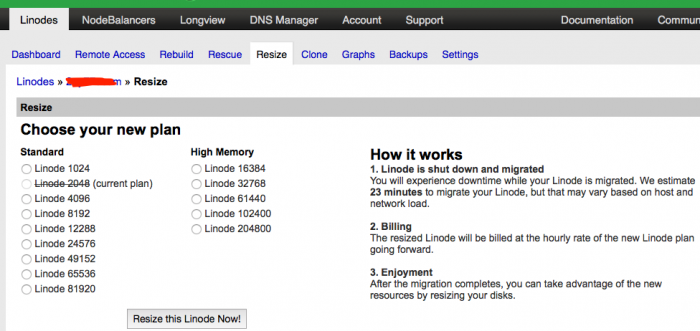
I recommend Linode Clone feature. This utility allows you to clone configuration profiles and their associated disk images to another Linode under your account. you can clone node’s disk image and configuration precisely to another node. no network configuration needed on the new node. you can clone one server to another datacenter. it’s useful when clone server configuration without spending much time.
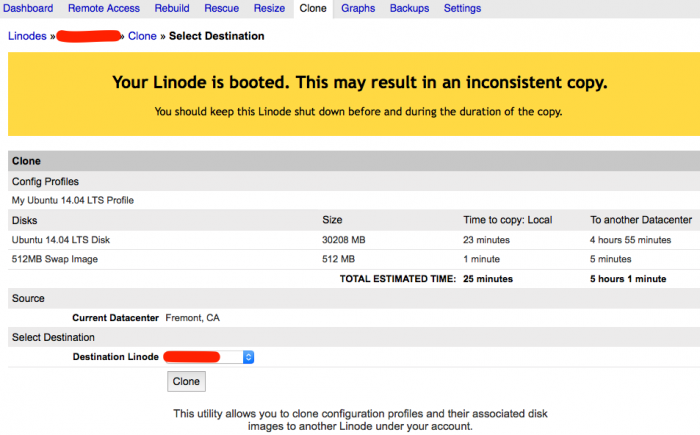
migration in digitalocean has many limits. you can only scale up a droplet. only RAM and CPU can be upgraded. migration to other datacenter can be processed by taking snapshot and restore it.
Vultr only allows upgrade to bigger plans. migration is done through making snapshots and restore it.
Choosing Operating Systems
Linode is special when choosing linux operating systems. It provides latest Linux kernel with Centos, Ubuntu, Arch, Debian, Fedora, openSUSE, Slackware with 64 bit distributions. older 32 bit distributions also included but not recommended. all nodes are installed with Linode’s customized Kernel. you can revert back to default kernel image by booting in legacy mode.
Linode provides transfer pool. all nodes share one transfer pool under your account. this flexible and versatile feature is very useful when you manage more than one vps on Linode.
Linode allows users to set up sub accounts with specified account permissions to access certain parts of the control panel. great tool for team management.
Google’s BBR congestion algorithm is available as default with Linode. If you choose latest distortion on Linode and benefit higher tcp network speed.
Vultr has advantage on operating systems. users can choose 32 bit or 64 bit distributions of Ubuntu, CentOS, Debian, FreeBSD. Windows 2012 R2 x64 is available with additional charge. Snapshot restoration is included.

Vultr has an option called custom image. users can upload their own ISO images(upload or download from a URL). You can install your cracked Windows Server ISO if you like(many users do, but not recommended).
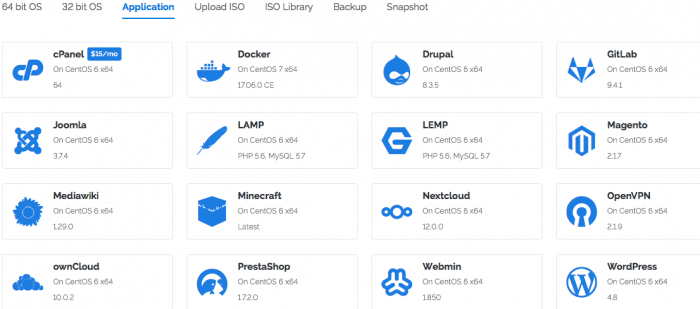
one-click apps Vultr has to offer
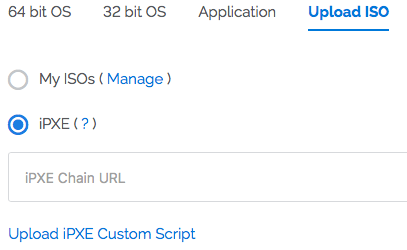
Digitalocean has fewer distributions to select. Ubuntu, Debian, CentOS, Fedora are available with both 64 bit and 32 bit versions. Arch Linux is deprecated. You can deploy a droplet with your snapshots image, backups and recently destroyed droplets.
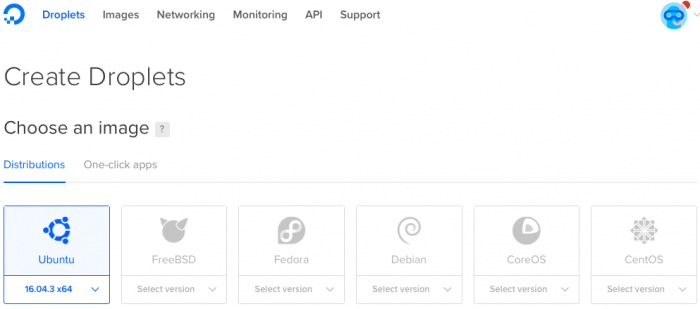
it’s interesting to see DigitalOcean has one-click app called machine learning and AI:
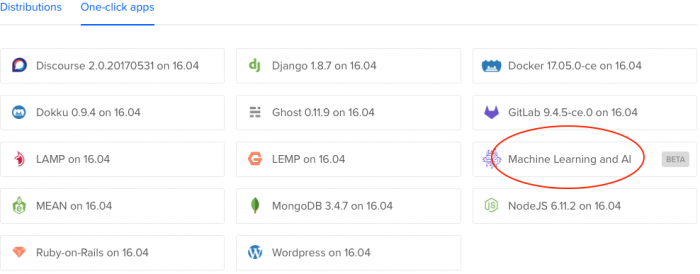
Wrapping up
- for better disk performance: Vultr is better than Linode and DigitalOcean.
- for flexible system configuration and mass deployment: Linode and Vultr are both good choices. DigitalOcean is your last choice.
- for resillent backup service, I recommend Linode.
datacenter they have:
| datacenter | Vultr(started 2014) | Linode(started 2003) | Digitalocean(started 2011) |
|---|---|---|---|
| America | Atlanta, Chicago, silicon valley, Dallas, Los Angeles, New York, Seattle, Miami | Fremont, Dallas, Atlanta, Newark | New York, SanFrancisco, Toronto(Canada) |
| Europe | London, Amsterdam, Paris, Frankfurt | London, Frankfurt | London, Frankfurt, Amsterdam |
| Asia | Tokyo, Singapore | Tokyo, Singapore, Mumbai(India) | Singapore, Bangalore(India) |
| Others | Sydney(Australia) |
don’t forget to use promo code and coupons when ordering them.
| Pricing | Vultr | Linode | Digitalocean |
|---|---|---|---|
| $5/mo | 25 GB SSD 1 CPU 1024MB Memory 1TB Bandwidth | 25GB Storage 1 CPU Core 1GB Memory 1TB XFER | 25 GB SSD 1 CPU 1GB Memory 1TB Bandwidth |
| $10/mo | 40 GB SSD 1 CPU 2048MB Memory 2TB Bandwidth | 50GB Storage 1 CPU Core 2GB Memory 2TB XFER | 50 GB SSD 1 CPU 2GB Memory 2TB Bandwidth |
| $20/mo | 60 GB SSD 2 CPU 4096MB Memory 3TB Bandwidth | 80 GB Storage 2 CPU Cores 4GB Memory 4TB XFER | 80 GB SSD 2CPU 4GB Memory 4TB Bandwidth |
vultr promo code($10 or $25):https://www.vultr.com/promo25b 、 SSDVPS
linode promo code:sixcolors ($20) 、DOCS10 、 LINODE10
digitalOcean promo code: $10